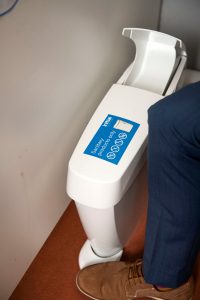By Jamie Woodhall, UK Technical & Innovations Manager, Initial Washroom Hygiene
In today’s competitive job market, attracting and retaining skilled employees is a key consideration for businesses. An inclusive workplace can help to create a positive atmosphere where colleagues feel appreciated and motivated. Washroom facilities that provide for a dignified experience for all users are within your gift. It can also boost staff retention and ultimately make sound business sense, with 77% of consumers perceiving a business more or less favourably, depending on the state of their washrooms*.
Washrooms are an essential part of any public or private premises and serve a basic human need. Ensuring washrooms are accessible and equipped for all users, regardless of their age, gender or any specific needs, is vital to providing a dignified and inclusive experience for all the occupants and visitors to your building.
Sanitary waste disposal
Keeping washrooms stocked with the basics (toilet paper, soap and hand drying facilities) is crucial in helping to deliver washroom dignity. Alongside these access to sanitary and period waste disposal should not be forgotten, and ideally waste bins should be placed in the toilet cubicle. Movements such as Period Poverty and Period Dignity have spurred a focus on improving facilities, to ensure those who menstruate are provided with a dignified experience. To really achieve this, access to period products alongside period waste bins should be provided in school, workplace, and public washrooms.
Male incontinence
 Washroom dignity extends to all washrooms male, female, and gender neutral. Research conducted by Initial Washroom Hygiene has revealed that 14 million people are estimated to suffer from bladder problems, and 6.5 million adults with bowel problems in the UK alone**. What’s more, although incontinence is commonly associated with women or older men, the research indicated that a significant proportion of sufferers are men aged 18 to 34 (39%). The study, which was conducted as part of our nationwide campaign – ‘Stalls For All’, also found that a third of male incontinence sufferers don’t have access to adequate provisions for disposing of their sanitary waste at their workplaces, not even in the disabled toilet.
Washroom dignity extends to all washrooms male, female, and gender neutral. Research conducted by Initial Washroom Hygiene has revealed that 14 million people are estimated to suffer from bladder problems, and 6.5 million adults with bowel problems in the UK alone**. What’s more, although incontinence is commonly associated with women or older men, the research indicated that a significant proportion of sufferers are men aged 18 to 34 (39%). The study, which was conducted as part of our nationwide campaign – ‘Stalls For All’, also found that a third of male incontinence sufferers don’t have access to adequate provisions for disposing of their sanitary waste at their workplaces, not even in the disabled toilet.
Shockingly, three in ten sufferers said they have been forced to carry a used incontinence pad in their bag or coat due to a lack of disposal facilities. It is important that waste disposal is not forgotten and that all washrooms have the right facilities to cater to all needs. The challenges experienced by those with continence-related issues are made worse by the stigma associated with the condition. Our survey also revealed that more than half of individuals (54%) who experience incontinence are reluctant to discuss it with their loved ones, while 44% feel ashamed to seek medical assistance.
Championing washroom dignity
Initial Washroom Hygiene is a champion of washroom dignity for all users regardless of their age, gender or need. We are committed to helping you to improve the facilities in your washrooms with the development of products designed specifically to help provide a dignified experience for all washroom users.
*https://www.initial.com/blog/air-care/business-impact-of-washroom-malodour
** https://www.england.nhs.uk/wp-content/uploads/2018/07/excellence-in-continence-care.pdf




